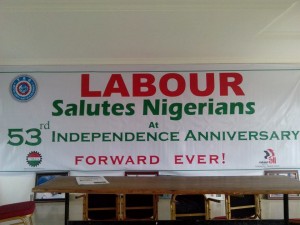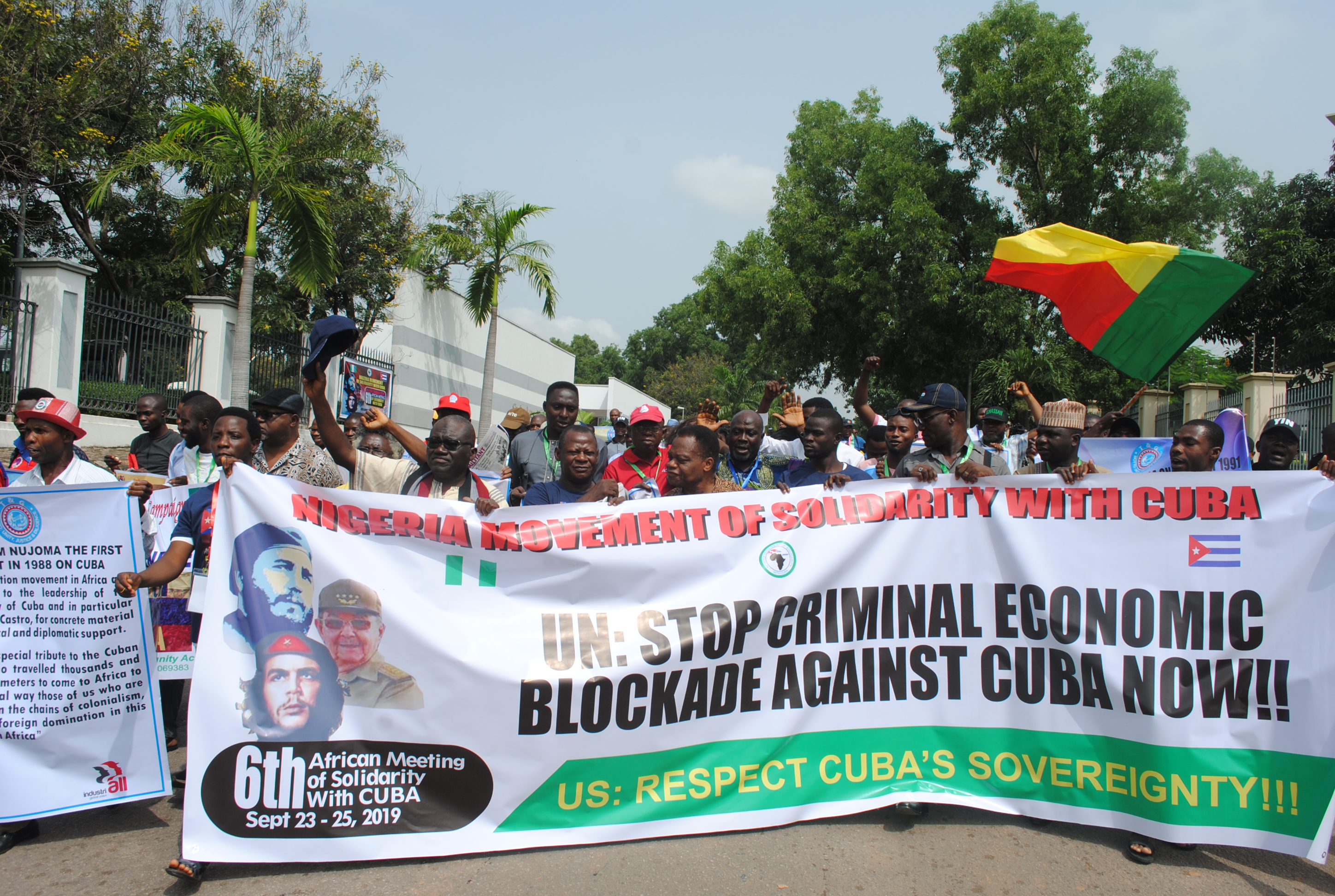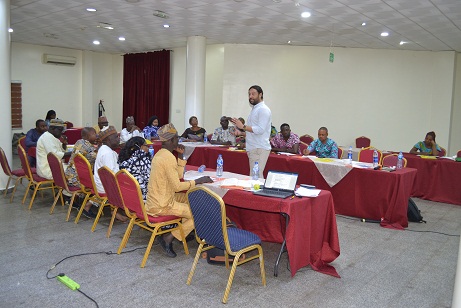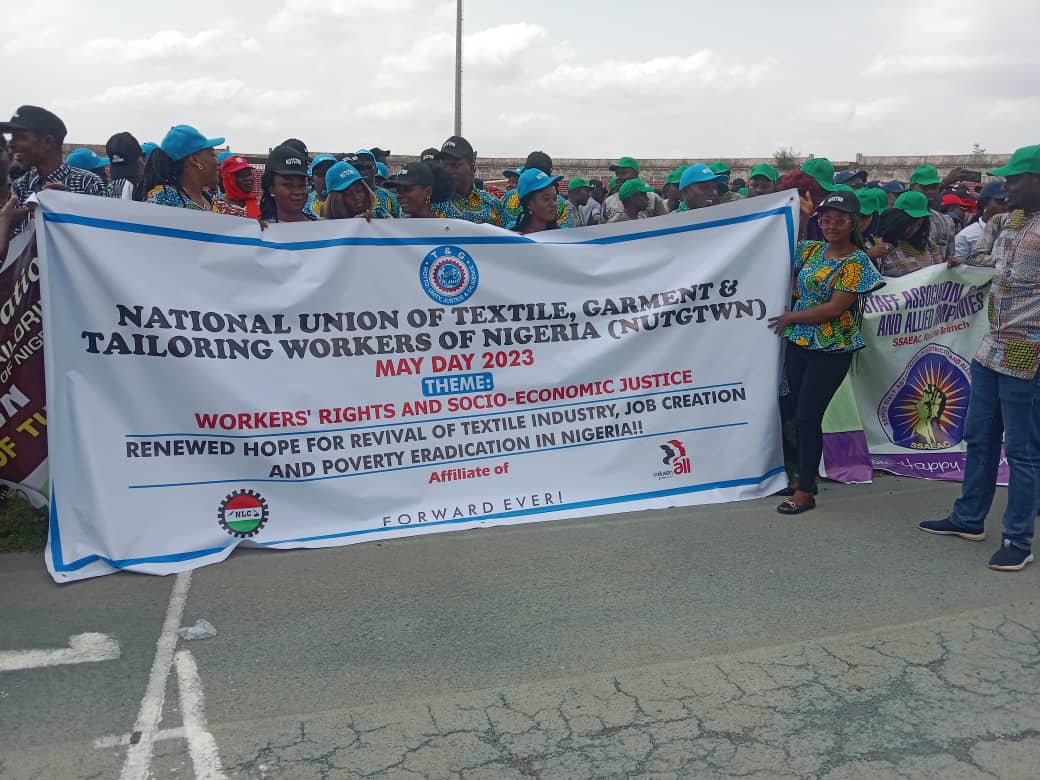APPRECIATION to the leadership of the union for organizing the celebration of Nigeria’s 53rd Independence anniversary.
LABOUR SALUTES NIGERIA AND NIGERIANS
May 1st every year is workers’ Day. October 1st marks annual Independence Day. The two days are important for us in the labour movement. It is not one or the other. It is both! On Workers’ Day we celebrate the dignity of labour. We are however not just labour or just a factor of production. We are also citizens of the biggest country in Africa. We congratulate President Goodluck Jonathan, Nigeria and Nigerians at 53 years as an independent nation.
NIGERIA IS OLDER THAN 1914
Please note that as a nation, Nigeria is over a thousand of years old. Indeed great Sokoto Caliphate, Sheikhdom of Borno, the Igala and Jukun Kingdoms, Oyo and Benin empires, Niger Delta kingdoms that make up present Nigeria boasts of thousands of history older than many countries of Europe. Eminent Nigerian historians like the late Dr Bala Usman of Ahmadu Bello University, J.F.Ade Ajayi, Emeritus Professor of History at the University of Ibadan and E.J. Alagoa, Professor of History at the University of Port Harcourt have correctly shown that Nigeria’s history did not start with the so-called amalgamation of the North and Southern Protectorate of 1914 by Lord Lugard. They rightly show that the “geographical compactness of Nigeria” preceded colonial presence and that Lord Lugard only formalized what was already a reality.
CELEBERATE INDEPENDENCE NOT COLONIALISM
Today we call on President Goodluck Ebele Jonathan and the presidency to come terms with Nigeria’s correct history. President Jonathan in his broadcast this morning said “On January 1, 2014, Nigeria will be 100 years old as a country, following the amalgamation of the Protectorates of Southern and Northern Nigeria in 1914.” I think the President got it wrong.
The President should abandon the fairy tale that falsely says Nigeria became one entity in 1914. 53 years after independence, it is an embarrassment to teach our children that Mungo Park discovered River Niger, as if the great peoples who long lived by the banks of River Niger did not know the River Niger. It is even totally unacceptable to accord colonial Lord Lugard the undeserved grandfather of modern Nigeria. Lord Lugard did not form Nigeria through his so-called amalgamation of exploitation and oppression. He met Nigeria and Nigerians who had coexisted through commerce, trade, marriages and even exchanges of Royal ambassadors. It is not surprising that Nigeria and Nigerians had outlived Lugard. It is certainly embarrassing to deploy scarce resources to celebrate an old discredited colonial myth that says Nigeria of today is a product of so-called amalgamation of the North and the South of 1914. Nigeria has no business celebrating colonial land mark of 1914 so-called amalgamation as it plans to do with fanfare next year. On the contrary, what Nigeria should celebrate in high spirit is independence day of today. Nigeria’s founding fathers fought with high patriotic spirit to get freedom for Nigeria in 1960 after century long colonial oppression and domination. They included Chief Comrade Micheal Imoudu, Zik of Africa, Obafemi Awolowo, Aminu Kano, Raji Abdallah, Zaidu Zugru, Margaret Ekpo, Gambo Sawamba etc. These great founding fathers were never nostalgic of 1914. In fact they turned 1914 of dependency to 1960 of independence. They were proud of 1960 as a freedom year. They marked independence with fanfare until the military disastrous intervention of 1966. The best to do to honour their efforts is to also in high spirit raise the banner of independence and freedom 53 years after.
NIGERIA IS ALSO 50 YEARS AS A REPUBLIC
Today’s independence anniversary even assumes a special importance. It marks the 50th year of Nigeria as a Republic. Nigeria becoming a Republic means Nigeria’s complete journey to full independence and maturity as a nation ended in 1963, not necessarily in 1960. A republic simply means having a Nigerian as our Head of State. Dr Nnamdi Azikwe in 1960 was undoubtedly the Head of Government in 1960. But he was a Queen appointed Governor-General that succeeded Sir James Robertson at the discretion of Her Majesty, Queen Elizabeth the second! He was just a figure head. The Executive authority was still vested in Her Majesty, Queen of England. Indeed until 1963, Nigeria was still constitutionally a Dominion or Protectorate.
To show the significance of Nigeria as a Republic, Sir Abubakar Tafawa Balewa the then Prime Minister on the 29th of April 1963 announced that the country would become a Republic within the British Common Wealth on the 1st of October 1963. Nigerian leaders regardless of political affiliations agreed it was an embarrassment that the most populous African country still operated at the mercy of the Queen of England. So the Federation Act of 1963 repealed and replaced the 1960 Independence Act of the British parliament and installed Republican Constitution of 1963. History and patriotic moves of the founding fathers show that what indeed Nigeria should genuinely celebrate as an achievement is the move from Monarchical to Republican constitution in 1963 not the colonial preference of Lord Lugard of 1914.
WHY INDEPENDENCE CELEBRATIONS DAY MATTERS
Charity, they say begins at home. The history of labour in Nigeria shows that Independence is important. We are indeed in a globalised world. But in this globalised world everybody knows his or her country. Without Nigeria, there can be no Nigerian labour much less Nigeria Labour Congress (NLC). Of course there was Nigerian free labour before the British colonialists came in after the Berlin Conference of 1878. Colonialism later forcefully imposed forced labour to build the railways, work on the coal mines of Enugu and Tin mines of the Plateau and the nascent civil service among others. Colonialism underdeveloped Nigeria and Nigerian labour through brutal exploitation and denial of trade union rights.
The first workers’ strike was in Lagos in 1897 against the colonial Governor Henry McCallum. Governor Henry unilaterally cut wages of the workers and raised the hours of work. Lord Lugard became the commissioner of Northern Nigeria in 1901. His first policy measure was to ask Royal Niger Company to reduce wages. In fact the so-called amalgamation was the amalgamation of the colonial oppressions of all the colonial enclaves in the North, South, East and West. In 1949 under Lugard for instance, 21 defenseless coal miners in Iva Valley in Enugu on strike over poor working conditions were murdered while 51 were wounded. All those who gave solidarity to the coal miners in protest rallies in Aba, Port Harcourt, Onitsha and Calabar were rounded up and jailed or fined. Colonialism also imposed exploitation, excessive taxation and wage reduction. This provoked Micheal Athokhamien Imoudu to unionise the railway workers in 1932. He eventually led the first General Strike in 1945. The strike lasted 44 days in Lagos and as many as 52 days in some other provinces. This historic strike laid the foundation for the struggle for independence supported in particular by Nnamdi Azikwe’s NCNC. The first generation of trade unions were the Civil service union (1912), Nigerian Union of Teachers NUT, 1931 and Nigerian union of Railwaymen, 1932. Workers and unions were few under colonial rule because colonialism was not for development but exploitation. It did not build schools. It did not build hospitals. It certainly did not set up factories. Certainly it was independent Nigeria that formed Super Eagles that won Olympics football cup in 1986. There was no Segun Odegbami, Kanu Nwankwo, Mikel Obi, Okorocha and other notable stars. Therefore there were no private sector unions as such.
At the height of British colonial rule in 1940s, there were less than 10 trade unions in Nigeria. In 2013, there are more than 60 industrial unions Affliates to NLC with 5 million workers. Colonialism wanted slave labour without pay and lack of respect for minimum labour standards in terms of minimum wages and health and safety rules. Today, we have minimum wage Act that has been reviewed more than thrice. There is pension Act and employees’ compensation Act. In fact there are as many as 30 legislations on exclusive and concurrent lists dealing with labour market issues all enacted after independence.
Textile union in particular owns its existence to independent Nigeria. The first textile mill started in 1957 at KTL here in Kaduna. By 1980 Nigeria was the largest producer of textile with direct workforce of 200,000 workers. The lesson here is that it was independent Nigeria that grew the real sector of the economy and the modern working class not colonialism.
I agree with President Jonathan this morning that; If we look back over the years, we can say confidently that there is every reason to celebrate”. Therefore Nigerians should never think that foreigners would ever develop Nigeria because our past experience with British colonial rule shows that it underdeveloped Nigeria. Also the reason to celebrate independence cannot be overstated. Another lesson is that the recent collapse of industries nationwide means that inadvertently, our leaders at Federal and state government levels are not better than the discredited colonial masters who saw us as producers of raw materials and consumers of imported finished goods from abroad. Indeed our leaders today are unacceptably returning us to another forms of colonialism and independence which at independence the founding fathers tried to reverse through massive Industrialization and electrification projects of the 1950s 1960s and 1970s.
REINDUSRIALIZE NIGERIA TODAY
At 53rd Nigeria boasts of GDP Annual Growth Rate of 8.6 Percent. However the share of industry and agriculture to this GDP growth is lower than 1960 and 1970 when industry was the key determinant of growth. We regret that at 53, Nigeria’s growth drivers are not the manufacturing sectors but banking and finance, telecoms services with very little employment content. At 53, Federal and state governments should make case for reindustrialization of Nigeria. At 53, somebody must speak for Nigeria’s re-industrializtion. Stop the current massive illegal imports, counterfeiting, gross under-capacity utilization, collapse of industrial estates and mass job-losses. Without Industrialization, Nigeria should forget independence. Industrialization is at the heart of development. The advantages of industrialization include lessening of dependency on imports, thus saving scarce foreign exchange and creation of mass decent jobs. Let’s not forget; Colonialism undermined the growth and development of domestic industry through a deliberate policy of import and blatant indifference to local efforts to promote indigenous enterprises. Independence must make a difference otherwise colonialism becomes attractive.
We commend the Governor of the State of Osun, Eng Rauf Aregbesola for initiation the setting up of a garment factory through provision of school uniforms and sewing them locally. Put appropriate industrial policy in place, stop smuggling, government spending should have local content and industry will grow again. There can be no re-Industrialization without electrification. Yesterday, President Jonathan formally handed over the power sector to the new private winners in the bids for privatization. This development is significant. However there can be no sustainable power sector reform without immediate resolution of all labour issues with respect to payment of severance pay and crediting the retirement saving accounts of the outgoing workers in the power sector. There must also be job retention and indeed job expansion. Lastly privatization is the means not the end. What Nigerians want is cheap uninterrupted electricity supply. As the deteriorating services in telecoms show, Privatization is no substitute for good governance and service delivery. Government and regulatory agencies must see to it that bid winners become real suppliers of electricity not players making money at the expenses of industry and consumers alike.
A PERFORMING REPUBLIC, NOT A DEBATING SOCIETY
The challenge of re-Industrialization means that Nigeria at 53 must be a performing society not a debating society. Nigeria has over 10 written constitutions from 1954. America still retains the same constitution as proclaimed in 1788 (with few amendments in 1791). Nigeria has certainly had it’s fair share of constitutions and debates. Another Sovereign national conference is one debate too much, too diversionary and too wasteful. It’s time Nigeria had it’s share of good governance. The founding fathers did not agonize debating the imperfections of the inherited Federation. They moved into action to build a fast growing nation ahead of China, India, Pakistan and Indonesia in the 60s and 70s. The best of Nigerians must come out for public office just as the best fought for independence and reclaim the politics from the existing largely unfocused acrimonious self serving ruling class.
IMPLEMENT THE EXISTING LABOUR LAWS, YOU DO NOT Need New labour laws
At the media chat on Sunday President Ebele Jonathan in his apparent frustration with the ongoing ASSU strike muted the idea of tightening the labour laws to curb strikes. 53 years after independence Nigerian leaders should not behave like the discredited colonial masters who wrongly saw labour as an obstacle rather than partner for development. Labour is a critical success factor in development. It must be consciously motivated and cultivated for productivity by the governments and private employers alike. The issue is not the strike but the causes of the strikes. President Jonathan accepts as much that there is a huge needs gap in the education and health sectors. Indeed for as long as these huge deficits exist, crises are inevitable.
Government cannot and should not turn its acknowledged weakness in funding and motivation in the public sector to strength through unnecessary arrogance and bullying. All parties in the universities must abide by the principle of collective bargaining, namely respect sanctity of agreements and negotiate in good faith and without duress. In case of a break down in negotiation, Nigerian labour laws also provide for arbitration through the Industrial Arbitration Panel (IAP) and the National Industrial Court (NIC). Sadly none of the parties in the crisis in education has explored any of these legal framework. Indeed it is the presidency that is politicizing purely industrial issue through setting up high sounding presidential panel manned by embattled governors and politicians who see politics in every noise if a fly rather than seasoned industrial relations experts who have a mindset of conflict resolution. At 53, independence celebration is hollow if public universities remain closed and the burden is on President Jonathan to govern for good.
DEEPEN DEMOCRACY
The challenge is to deepen democracy.









